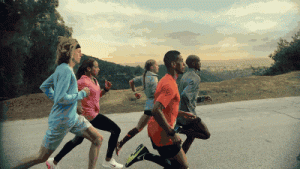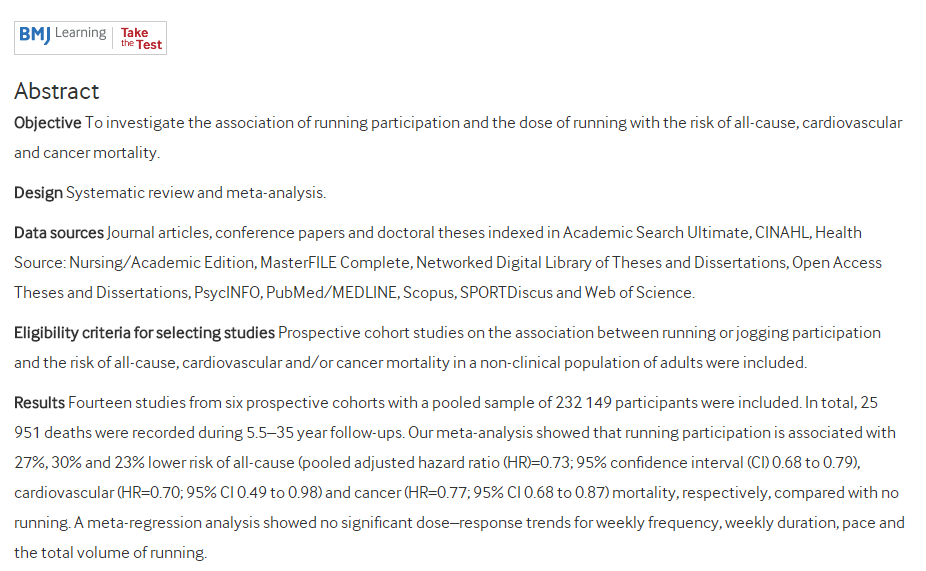
Running is a very simple sport because of its low threshold and no requirements for the venue, it is sought after by sports enthusiasts.
However, many people believe that “running Bailey only hurts the knee” and believes that this is one of the important causes of joint injuries, and they should stay away from running.

Is running good or bad? How should amateur runners run?
Combined with foreign research and interviews with experts, interpret the health benefits of running and remind you of several things you should pay attention to when running.
Run once a week to reduce the risk of premature death
Do people who run often have bad knees?
In 2014, Dr. Grace Hsiao-Wei Lo of Baylor College of Medicine found in a study that, regardless of age, as long as you run regularly, it will not increase the risk of knee osteoarthritis, but will reduce the chance of knee pain.

The Journal of Orthopaedics and Sports Physiotherapy pointed out that the incidence of arthritis among competitive runners was 13.3%, the incidence of arthritis among sedentary people was 10.2%, and the incidence of arthritis among fitness runners was only 3.5%.
Therefore, as long as the posture is correct and the running exercise is controlled, it is still good for the body.
A new study published in the British Journal of Sports Medicine by researchers from the University of Victoria in Australia shows that running once a week for no more than 50 minutes at a time and a speed of less than 8 km/h has significant health benefits.
Researchers evaluated the running activities of 25,951 participants who died during the study and found that in different participating populations, runners of any degree reduced the risk of death from any cause by 27%, and the risk of death due to cardiovascular disease Reduced by 30%, the risk of death from cancer has been reduced by 23%.
The lead author of the research report, Ph.D. Zeliko Pedisic of the University of Victoria, said: “Any running can be good for health, and running once a week or running 50 minutes a week can achieve this effect.”
Running brings 5 major health benefits
Insist on running, in addition to having a strong body and reducing the risk of premature death, it will also bring the following 5 major benefits to the body.
Extend your life
A study published in the American Journal of Cardiovascular Disease Research Progress found that one hour of running can prolong life by 7 hours, even if the running speed is slow or only occasionally.
Based on an average of 2 hours of running per week, the time spent on running in 40 years is less than 6 months, but the life span may be extended by 3.2 years.
Improve skin
Regular running will speed up the body’s metabolism and make the skin delicate and shiny.
Protect the heart and lungs
Steve Blair, an epidemiologist at the University of South Carolina in the United States, said that six miles a week can prevent heart disease. In addition to protecting the heart, running can also increase vital capacity and oxygen uptake.

Improve mood
Running is a great way to eliminate depression. Because in the process of running, the body will release a large amount of neurotransmitters such as endorphins, dopamine and adrenaline, which makes the body and mind happy.
Keep the brain young
A number of studies have confirmed that regular exercise in middle-aged and elderly people can keep their brains young.
Running can even stimulate the growth of new cells in the memory center of the brain, thereby helping to prevent cognitive dysfunction, namely known as Alzheimer’s.
4 things you need to pay attention to when running in cold weather
Running in cold weather can not only improve cardiorespiratory function, strengthen physical fitness, but also invigorate the spirit and exercise the will. But at the same time, if you want to “run” in a cold weather, you need to pay attention to the following points.
No.1. The sun comes out and then runs
Although the beginning of spring, the sunrise is still late, and the exercise time should be adjusted accordingly to prevent the weather from getting too cold in the morning, which may induce cardiovascular and cerebrovascular diseases.

It is best to wait for the sun to rise before running. Do not go out for running in severe weather such as rain, snow, haze, etc., to avoid risks such as slipping and inducing cardiovascular and respiratory diseases.
No.2. Preparation and organization activities should be strengthened
Fully warm up before running to make muscles and joints gradually soften and become flexible, which is especially important in cold weather.
Under low temperature conditions, the contraction speed and strength of human muscles will decrease. Insufficient warm-up or running without warm-up is like pouring hot water into a cold glass, which can easily cause sports injuries and fatigue when running.
Before running, spend 5 minutes doing lunges, flexion, shoulder looping, etc., move the limbs, waist, abdomen, knee joints, ankle joints, and then run slowly for 10 minutes. After the body enters the state, then boost speed.
In addition, the same intensity of exercise in cold weather is more likely to cause lactic acid accumulation. Therefore, stretching after exercise is more essential.
No.3. Master the correct breathing method
Running in cold weather and breathing with your mouth can easily cause discomfort in the throat after exercise, and even cause inflammation of the respiratory system, chest pain or cough.

When running, it is best to breathe through the nose. When the snorting cannot meet the oxygen supply, you can slightly open your mouth and breathe with your tongue against the upper jaw. Avoid direct inhalation of large amounts of cold air and irritate the respiratory tract. You can try two steps of one suction or three steps of one suction to help your body maintain a good rhythm, so that it is less fatigued and the exercise effect is better.
No.4. Replenish water in time
A study by the American Sports Medicine Association showed that in cold weather, the body cannot normally sense the signal of water shortage. The air is cold and dry. Although the human body generally does not feel sweating, in fact, the water lost by sweating and the water consumed by breathing is as much as in summer. Therefore, it is very important to replenish water in time during running and replenish water after running.
Finally, it needs to be reminded that the turn of winter and spring is the season of high incidence of cardiovascular and cerebrovascular diseases. Patients with chronic diseases, especially those with cardiovascular and cerebrovascular diseases, should take appropriate exercise intensity and time under the guidance of a doctor, and should not run by themselves.
Comments